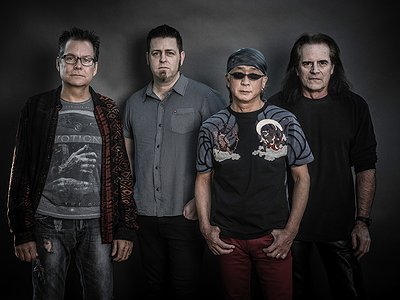Collaborations can take on many forms. What role do they play in your approach and what are your preferred ways of engaging with other creatives through, for example, file sharing, jamming or just talking about ideas?
I am incapable of writing lyrics, so any song that I write has to have collaboration. I am also usually open to melodic changes to my ideas and arrangement changes if they make sense, so I think I'm a pretty good collaborator when I'm in one of my songwriting phases. However, I tend to freeze up a bit, or at least not be able to concentrate as deeply as I'd like when other people are in the room, so file sharing has been completely a great way for me to collaborate. I really like verbal discussion on general musical direction on particular pieces of music or collections of music. That is a great way to focus creative energy. But when it comes down to actually writing, I like to be alone. I really dislike jamming, actually. In my experience, jamming is usually very time consuming and disappointing, and the results are things that the players were able to come up with off the top of their heads, which is usually not nearly as creative or original as what they could do otherwise.
Could you take us through a day in your life, from a possible morning routine through to your work? Do you have a fixed schedule? How do music and other aspects of your life feed back into each other - do you separate them or instead try to make them blend seamlessly?
Get up early, feed the cats, make coffee and a little breakfast, drink coffee and eat breakfast, check emails, get annoyed with Facebook for a little while, and then work on various things for most of the rest of the day. Those things can be building a fence, doing a bass track, doing errands, driving to a gig ... it all depends on what needs to be done that day. Then at some point, it's some form of exercise, feed the cats again, make dinner, watch the tele for an hour or two, then go to bed. When I was younger my best work would be late at night, but I just can't stay up that late anymore. Except when I have a gig, then I roll in at 3:00am.
Could you describe your creative process on the basis of a piece or album that's particularly dear to you, please? Where did the ideas come from, how were they transformed in your mind, what did you start with and how do you refine these beginnings into the finished work of art?
Well, I guess let's take a look at the piece that John Boegehold and I wrote for the album "Octane", the piece being A Flash Before My Eyes. It's a seven part suite with the basic premise being a man's life flashing before his eyes as he dies in a car accident. Cheerful topic, isn't it? :-)
Part One is the accident itself, then Parts Two through Seven are meant to represent different important memories in the man's life, going chronologically from childhood, through adolescence, first love, marriage and adulthood and finally his acceptance of death.
The style and genre of each section of music is meant to match each of the memories. In other words, teenage frustration is written with sort of an angry metal tone, first love is a beautiful ballad, etc.
I think the very beginning stage of writing this piece started with a musical idea that John had, which eventually turned into the first part of the song suite, the car accident itself. He passed it to me, I added a couple minutes to it, which I had envisioned as that eerie quiet time right after something catastrophic happens. (At that time the story of the song had not been written, but that first bit that he sent me seemed very intense and dissonant, and I got the feeling of some type of emergency situation from it. I remembered a car accident that I had been in when I was a kid and how quiet and peaceful it was for a few seconds before I fully came to my senses, and I tried to recreate that musically.) Then I passed it back to him, we started passing it back and forth, adding sections and coming up with new ideas as we went along. Each time one of us added an idea it would seem to instantly trigger the next idea.
Sometimes the next idea would be very general, for example "OK, now it's time for an adolescent memory", and the basic musical idea would come from the little file of random ideas that had been recorded in the past for possible use, sometimes it would come from a new inspiration.
After that it was trying to figure out transitions between song sections that were intentionally quite different from each other, eventually leading back into the main musical theme.
There are many descriptions of the ideal state of mind for being creative. What is it like for you? What supports this ideal state of mind and what are distractions? Are there strategies to enter into this state more easily?
I'm very easily distracted from being creative. The ideal state of mind for me is to be completely alone and relaxed so I can really follow an idea without having to explain myself to somebody or rush things. My strategies are to finish anything else that needs to be finished that day so that it is gone from my head, and pick a time where I can be away from other humans.
How is playing live and writing music in the studio connected? What do you achieve and draw from each experience personally? How do you see the relationship between improvisation and composition in this regard?
Well, for me, playing and writing music are not connected at all except for the fact that a song written keeping in mind that it will be eventually need to be played live is usually more fun to play. To me it's like the difference between building a car and driving a car. Writing is design and construction for me, playing live is a demonstration of hopefully what the songwriter's intentions were when the song was written. Playing live has a strong and immediate gratification (hopefully!) that is temporary. Writing creates a longer lasting gratification sometimes, but other times the gratification that I had when I first wrote something goes away completely.
How do you see the relationship between the 'sound' aspects of music and the 'composition' aspects? How do you work with sound and timbre to meet certain production ideas and in which way can certain sounds already take on compositional qualities?
I would imagine that there is a very strong relationship between the sound aspects and composition aspects, but for me personally … I don't know, I just try different stuff until something sounds cool to me and doesn't get in the way of anything else.
Our sense of hearing shares intriguing connections to other senses. From your experience, what are some of the most inspiring overlaps between different senses - and what do they tell us about the way our senses work? What happens to sound at its outermost borders?
The thing that always fascinates me is the relationship between specific memories and different senses. Sound and smell in particular. If I smell cigar smoke for example, or a particular perfume, or hear a particular song or even maybe an industrial noise, I get very vivid mental images of an exact moment in my past. Visual cues, taste, and sense of touch, not so much for me, although maybe for other people those are the strongest memory triggers.
As far as different senses reacting with each other, I don't experience that very much except of course the interdependence between smell and taste. In fact, for me, one sense can counteract the other senses, my brain focuses on one at a time. I'm a pretty simple beast.
Art can be a purpose in its own right, but it can also directly feed back into everyday life, take on a social and political role and lead to more engagement. Can you describe your approach to art and being an artist?
Well, I'll be honest here. I don't really think about that aspect of it too much. I play music for selfish reasons, mainly because it is somehow very satisfying to me, and it's as simple as that. If someone is inspired by something I've written or a concert I've played that's absolutely great, but I don't have the ego to make that a motivating factor.
It is remarkable, in a way, that we have arrived in the 21st century with the basic concept of music still intact. Do you have a vision of music, an idea of what music could be beyond its current form?
That's the big question, isn't it, what music can evolve into next? We're all trying to figure that out so that we can be part of the next thing whatever that might be. But yes, music will always be around in one form or another. Our brains are wired to make connections between sounds and rhythms, and music organizes sounds and rhythms in a way that is pleasing to us so we will always find a way to create that for ourselves.



